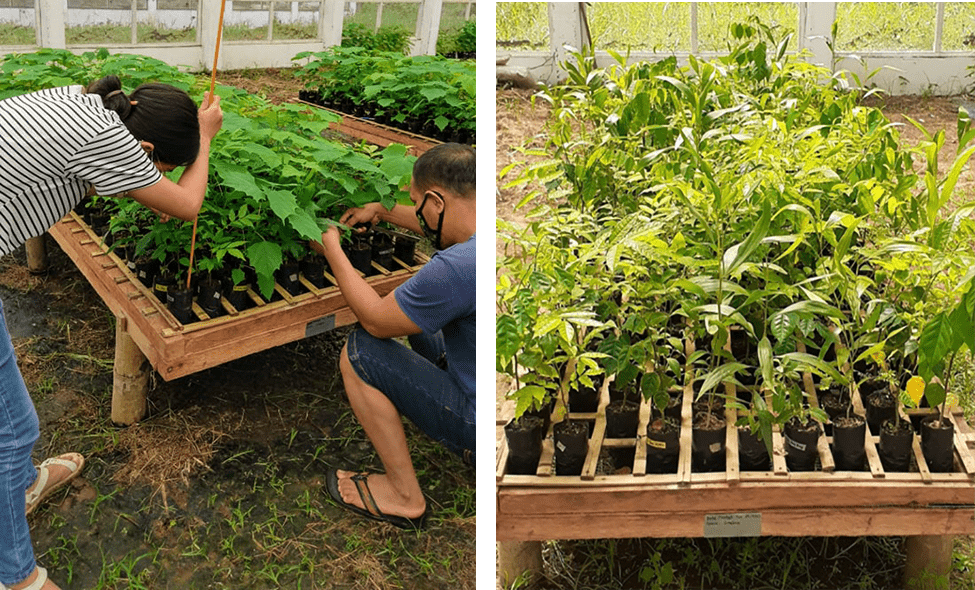

Collaboration is key! Improving tropical tree seedling quality in the Philippines
November 17, 2021

It’s good to report that some of our student awardees are managing to get their research done, despite not being able to travel as planned. Vithya Krishnan, a student from the School of Agriculture and Food Science at the University of Queensland received a 2019 Crawford Fund student award to work on a research project improving the seedling quality of frequently planted tree species in the Philippines. Her research was part of an ACIAR project ‘Enhancing livelihoods through Forest and Landscape Restoration’, and it was undertaken in conjunction with Visayas State University in the Philippines. Vithya recently provided us with this report on her student award and how she managed to get it completed without travelling to the Philippines as planned. It seems with or without travel, collaboration is key!
It is currently the decade of ecosystem restoration as announced by the United Nations. This is important in seeking to restore degraded land that was previously cleared for agriculture and timber purposes, and it is especially crucial in tropical regions as productive forest lands hold large carbon stocks, reported Vithya.
Restoration of degraded land, however, is a complex process involving stakeholders, site and species selection, nursery management practices, climate considerations, and livelihoods of local people. A common bottleneck with restoration comes from the poor tree seedling survival rates achieved once they are planted in the ground, and this is due to factors such as poor seedling quality, harsh site and climate conditions, and poor species selection.
“I collaborated with our Philippines partners at the Visayas State University to run a glasshouse experiment testing different sources of nitrogen to enhance seedling growth for restoration. The experiment aimed to determine if organic nutrients (i.e., amino acids/compost) provided better growth compared to inorganic nutrients commonly used for tree seedlings cultivated in Leyte, Philippines,” said Vithya.
“We grew five tropical tree seedlings (Acacia mangium, Gmelina arborea, Dracontomelon dao, Pterocarpus indicus, and Eucalyptus deglupta) with a standard nursery protocol that can be used for the future,” she said.
Due to travel constraints caused by COVID-19, Vithya facilitated the set-up of the experiment in the Philippines remotely from November 2020 to April 2021. This involved regular communication through emails, Zoom, and messaging applications.
“This worked well as my collaborators and I always checked that we were on the same page, and we wanted to ensure that the set-up and maintenance was correct so that it can be replicated in the future,” said Vithya.
According to Vithya, generally, all seedlings grew well on the nitrogen sources and certain species (Acacia mangium and Dracontomelon dao) had specific substrate preferences. The results showed that the sources can either be used or adapted for the future. She also found that, vermicompost can be used as a substitute for compost depending on the species and the growth requirements for restoration planting, and this is beneficial because creating vermicompost also contributes to the livelihood activity of the local people in Leyte.
“Ultimately, this project has contributed to knowledge on tree seedling growth preferences in the Philippines. I think that collaborating and coming up with a standard method to grow seedlings was the main benefit in this project,” she said.
“Moving forward, my collaborators will be able to use this method and adjust as necessary depending on the type of seedling growth required. They will be able to determine if the seedlings grown would improve survival rates as they continue with restoration efforts,” said Vithya.
“I would like to thank the Crawford Fund for giving me the opportunity to undertake this project with the student award. Due to COVID-19, this project was delayed, however, we were able to rescope and move forward with the proposed activity,” said Vithya.
“I especially thank the staff in the Philippines who were instrumental in setting up and maintaining the experiment – Nestor Gregorio, Maria Opelia Maranguit Moreno, Nova Santa Parcia, Crisanto Solano, Katty Rife, and Rogelio Tripoli,” she concluded.




